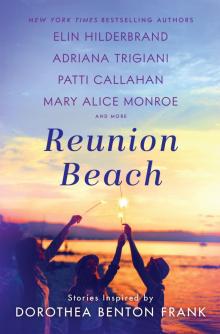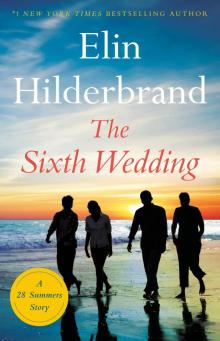- Home
- Elin Hilderbrand
The Perfect Couple Page 4
The Perfect Couple Read online
Page 4
“Rare?” the Chief asks.
“Rare,” Roger says. “I hate that this happened on her wedding day. She was a complete mess.”
“Let’s try to figure out what happened,” the Chief says. “I’m starting with you because I know you have work to do.” The Chief leads Roger over to a white wrought-iron bench tucked under an arbor that is dripping with New Dawn roses and they both sit down.
“Tell me what you saw when you got here,” the Chief says. “From the beginning.”
“I pulled in about quarter to six,” Roger says. “The rental company was supposed to leave seventeen rounds and a hundred and seventy-five folding chairs. I wanted to double-check the numbers, see how the dance floor settled, make sure there hadn’t been any after-hours partying. Standard stuff.”
“Understood,” the Chief says.
“As soon as I got out of my car, I heard screaming,” Roger says. “And I realized right away that it was Celeste. I thought something had happened to her mother.” Roger pauses. “Celeste’s mother, Karen Otis, is very sick—cancer. Anyway, I could tell just from the kind of scream that someone was dead. It had that urgency. So I go charging out to the front of the house and there’s poor Celeste trying to pull her friend out of the water by the arms. One look at her, I knew the girl was dead, but I helped Celeste drag her up onto the beach and then I tried to revive her.”
“CPR?”
“I tried,” Roger says. “I… tried. But she was dead when I found her, Ed. That much I know.”
“So why bother with CPR, then?”
“I thought maybe. I had to try something. Celeste was begging me to save her. You have to save her, she said. You have to save her!” Roger drops his head in his hands. “She was dead. There was no bringing her back.”
“Then you called 911?”
“I had dropped my phone in the driveway so I used Celeste’s phone,” Roger says. “The paramedics came in six minutes. They tried CPR as well. Then the police came. Sergeant Dickson. Together, he and I knocked on the front door of the house.”
“And who answered? Who did you tell?”
“Greer Garrison, the groom’s mother. She and her husband, Tag Winbury, own the house. Greer was already awake. She was holding a cup of coffee.”
“She was? You’re sure about that?” the Chief says. “She was awake but didn’t hear Celeste screaming and didn’t notice you pulling a body out of the water in front of her house? With all of those giant windows, she didn’t notice? She didn’t hear the sirens or see the lights when the paramedics arrived?”
“Apparently not. She had no idea anything was wrong when I knocked.”
“When you told her, what did she do?”
“She started to shake,” Roger says. “Her coffee spilled. Dickson had to take it from her.”
“So it’s fair to say she seemed shocked and upset?” the Chief says.
“Oh yes,” Roger says. “Mr. Winbury came to see what the ruckus was and I told him as well. He thought we were kidding.”
“Kidding,” the Chief says.
“Everyone reacts differently, but the first emotion is, of course, shock and disbelief. Celeste was still screaming. She went into one of the guest cottages to wake up Benji—he’s the groom—and he tried to calm Celeste down but she was beyond helping. She was… well. Sergeant Dickson told the EMTs to take her to the ER.” Roger shakes his head. “I feel for her. It’s supposed to be the happiest day of her life and instead… her best friend…”
The Chief flashes back to the day he found out Tess and Greg were dead. He had gone right to the beach to find Andrea. Sometimes, in the dark of night, he can still hear the sound Andrea made when he told her that Tess was gone.
“There is nothing worse than the sudden, unexpected death of a young person,” the Chief says.
“Amen,” Roger says. “Anyway, while the family gathered inside, I made phone calls—the caterers, the church, the musicians, the Steamship Authority, the photographer, the chauffeur. I called everyone.” Roger looks at his watch. “And I hate to say this, but I have two other weddings today.”
The Chief nods. “We’ll get you out of here. I just wanted to ask if you noticed anything odd or peculiar or suspicious or noteworthy about the bride or the groom or the family or any of the guests. Did anything or anyone strike you?”
“Just one thing,” Roger says. “And it’s probably nothing.”
Probably nothing is usually something, the Chief thinks.
“What’s that?” he asks.
“Celeste…” Roger says. “She had her purse and her overnight bag out on the beach. And she was fully dressed. She was wearing her going-away outfit, the one she was supposed to wear on Sunday.”
“And you’re wondering…”
“I’m wondering why she was wearing it this morning. I’m wondering why she had her purse and her overnight bag. I’m wondering why she was awake at quarter to six in the morning, dressed that way, on the beach.”
“We’ll ask her,” the Chief says. “It does seem odd.” He thinks about what Roger is telling him. “Maybe she and the groom had decided to elope at the last minute?”
“I thought that too, but her parents are here… her mother… something about that doesn’t feel right to me. But she’s such a good kid, Ed. I’m sure there’s a logical explanation. It’s probably nothing.”
Initial questioning, Abigail Freeman Winbury, Saturday, July 7, 7:15 a.m.
Nick’s choices with the women are sparse. The bride, Celeste, has gone to the hospital; the mother of the groom, Greer Garrison, is busy on the phone contacting guests to relay the tragic news; and the mother of the bride, who is quite sick, is still in bed. It’s unclear if she has even learned what’s happened.
This leaves Abigail Freeman Winbury—Abby—who is the bridesmaid and the wife of the groom’s brother.
Abby is short with auburn hair cut bluntly at the shoulders. She has brown eyes and freckles. She is cute, Nick thinks, but not beautiful. When she walks into the formal living room where Nick is doing the questioning—it has glass doors that close, sealing it off from the hallway, the stairs, and the rest of the house—she is holding her breasts up with her hands. Nick blinks. It’s okay; he has seen stranger things.
“Hi, Abby, I’m Nick Diamantopoulos, a detective with the Massachusetts State Police. Thank you for talking with me.”
Abby lets go of her breasts to shake his hand. “Just so you know, I’m pregnant. Fifteen weeks along. I had an amnio a few days ago, and the baby’s fine. It’s a boy.”
“Oh,” Nick says. That, at least, explains why she was holding her breasts. Right? Nick doesn’t have children, and he has never been married, but his sister, Helena, has three kids and what Nick remembers from Helena’s pregnancies is that a certain amount of personal dignity goes out the window. Helena, who had always been rather private and discreet about her body and its functions, had complained about her aching (and then leaking) breasts as well as the frequency with which she had to pee. “Well, congratulations.”
Abby gives Nick a tired but victorious smile. “Thank you,” she says. “It’ll be the first Winbury heir. That’s important, I guess, to British people.”
Nick says, “I have some water here, if you’d like any. I’m sure you must be pretty shaken up.”
Abby takes a seat on the sofa and Nick sits in a chair opposite her so he can face her. “My stomach has been funny for weeks,” she says. “And this news is so terrible. I can’t believe it’s real. This feels like a movie, you know? Or a dream. Merritt is dead. She’s dead.” She pours herself a glass of water but doesn’t drink. “So do we know… is the wedding canceled?”
Nick says, “Yes, I believe so.” That’s what he overheard Greer saying on the phone, he’s pretty sure. That they’re canceling the wedding.
“Okay,” Abby says, but she sounds a little deflated. “I figured. I mean, Merritt is Celeste’s best friend, her only friend, really, and she’s dead.” Abby shakes her head as if to cle
ar it. “Obviously the wedding is canceled. I don’t know why I even asked. You must think I’m some kind of monster.”
“Not at all,” Nick says. “I’m sure it’s come as a shock.”
“Shock,” Abby says. “The wedding is a big deal—very expensive, you know, for Tag and Greer—and Celeste’s mother isn’t well and I just wasn’t sure if… if maybe they would just go through with it anyway. But of course not. Of course not. Please don’t tell anyone I asked.”
“I won’t,” Nick says.
“So… what happened?” Abby asks. “You’re a detective? Do you think someone killed Merritt? Like a murder?”
“By law, with unattended deaths, we have to rule out foul play,” Nick says. “So I’m going to ask you some questions. Easy questions. Just answer as honestly as you can.”
“Of course, of course. I just… I can’t believe this. I can’t believe this is happening. I mean, intellectually my mind knows it’s happening, but my heart is resisting. She’s dead.”
Nick says, “Tell me what you know about Merritt.”
“I’m not really the best person to ask,” Abby says. “I only just met her in May. We had a little bachelorette weekend here and it was the three of us—me, Celeste, and Merritt.”
“That’s all?” Nick says. “Nobody else?”
“Well, Tag and Greer were here. Greer kind of arranged it, just like she arranged the rest of the wedding. So my in-laws were here, but, like… no other women. It’s kind of weird? Celeste doesn’t have a lot of close female friends. When I got married, I had eleven bridesmaids. Some from St. Stephen’s, some from UT. I was president of the Tri Delts, that was my sorority. I could have had thirty bridesmaids. But Celeste had only Merritt, who was a friend she met in New York. Merritt does PR for the zoo where Celeste works.”
“Merritt worked in public relations,” Nick says. “And Celeste, the bride, works at a zoo, you say?”
“Celeste is the assistant director of the Bronx Zoo,” Abby says. “She knows a ton about animals, like genus and species and mating rituals and migration patterns.”
“Impressive.”
“And she’s only twenty-eight, which I guess is unusual in that world. Merritt discovered her, in a sense. She chose Celeste as the face of the entire Wildlife Conservation Society. Celeste’s picture is in the zoo brochure, and Merritt’s big dream was to get Celeste’s face on a billboard, but Celeste said no to that. Celeste is pretty conservative. They’re a funny match, actually—Celeste and Merritt—like the Odd Couple. Were a funny match. Sorry.” Abby mists up and waves a hand in front of her face. “I can’t let myself get worked up about this because of the baby. I’ve had four miscarriages…”
“I’m sorry to hear that,” Nick says.
“But poor Celeste. She must be devastated.”
Nick leans forward to make eye contact with Abby. “The best way we can help Celeste now is to figure out what happened to her friend. When you say that Celeste and Merritt were like the Odd Couple, what do you mean?”
“Oh, just that they were opposites. Like, complete opposites.”
“How so?”
“Well, start with their looks. Celeste is blond and fair, and Merritt had dark hair and olive skin. Celeste goes to bed early and Merritt likes to stay up late. Merritt has a second job—had, sorry—a second job as an influencer.”
“Influencer?” Nick says.
“On social media?” Abby says. “She has something like eighty thousand Instagram followers who are all just like her—beautiful urban Millennials—and so Merritt gets perks for building brand awareness with her posts. She gets free clothes, free bags, free makeup; she eats at all of these hot new restaurants, goes to velvet-rope clubs, and works out at La Palestra for free, all because she features them on her Instagram account.”
“Nice work if you can get it,” Nick says.
“I know, right?” Abby says. “Merritt is… was a social media goddess. But Celeste doesn’t even have a Facebook account. When I heard that, I couldn’t believe it. I thought everyone had a Facebook account. I thought people were, like, given one at birth.”
“I’m with Celeste,” Nick says. He once dated a woman who tried to get him to set up a Facebook profile but the idea of reporting his whereabouts, his activities, and, worst of all, the company he was keeping didn’t appeal to him. Nick is a confirmed bachelor; he plays the field. Facebook would be a liability. Speaking of which… “What about boyfriends? Did Merritt have a boyfriend that you know of?”
Abby gives him an uneasy look. One of the reasons Nick is so successful with women is that he has learned to listen not only to what they are saying but also to what they’re not saying. It’s a talent taught to him by his mother, his ya-ya, and his sister. Abby sustains eye contact long enough that he thinks she’s trying to tell him something, but then she shakes her head. “I couldn’t say for sure. You’d have to ask Celeste.”
“Abby?” Nick says. “Do you know something you’re not telling me?”
Abby takes a sip of water, then looks around the room as though she’s never been there before. It’s not a room that appears to get much use. The walls and trim are impeccably white, as are the half-moon sofa and modern egg-shaped chairs. There are three paintings on the wall, bright rainbow stripes—one diamond, one circle, one hexagon—and there are sculptures that look like Tinkertoys made out of steel and wooden spheres. There’s a black grand piano; the top is covered with framed photographs. On a low glass table sits a coffee-table book about Nantucket, which seems redundant to Nick. If you want to see Nantucket, go outside. You’re here.
“She came to the wedding alone,” Abby says. “Which tells me that either she didn’t want to be tied down or she had set her sights on someone who would already be at the wedding.”
Ahhh, Nick thinks. Now they’re getting somewhere. “Someone like who?”
“That’s another way they’re opposite!” Abby says. “Benji is Celeste’s first real boyfriend. And Merritt… well, she’s been with a bunch of people, I’m pretty sure.”
“But no one seriously?” Nick asks. He senses Abby trying to change the subject. “If you ladies went out on the town for a bachelorette party, you must have shared some confidences, right?”
“And also?” Abby says. “Their parents. Celeste is super-close to her parents. Like, abnormally close. Well, that might be unfair to say because her mother has cancer. Let me restate: Celeste is very close to her parents, whereas Merritt hasn’t talked to her parents in six or seven years, I think she said.”
This does succeed in capturing Nick’s attention because of the next-of-kin issue. “Do you know where her parents live?”
“No clue,” Abby says. “She’s from Long Island but not one of the fashionable parts, not the Hamptons or anything. She has a brother, I think she said. Again, you’d have to ask Celeste.”
“Let’s go back to your previous statement,” Nick says. “Do you think maybe Merritt was involved with someone who was attending the wedding and that’s why she didn’t bring a date?”
“Can I please use the ladies’ room?” Abby asks.
“Excuse me?” Nick says. He’s pretty sure she’s using the bathroom break to wiggle out of answering the question—but then he remembers Helena. “Oh, yes. Certainly.”
Saturday, October 22, 2016
CELESTE
Blair Parrish, the head herpetologist at the Bronx Zoo’s World of Reptiles, is a hypochondriac. She’s “sick” more often than can reasonably be believed. She calls in sick on a Saturday—by far the zoo’s busiest day—and Celeste assigns Donner from the Aquatic Bird House to cover Blair’s ten o’clock snake talk. Donner complains about it (he’s an expert on Magellanic penguins and literally nothing else), so Celeste assigns Karsang from the Himalayan Highlands to cover Blair’s one o’clock snake talk and then she, Celeste, covers the three o’clock snake talk even though handling snakes is her least favorite task at the zoo. Celeste’s specialty is primates, but as th
e assistant zoo director—the youngest in the entire country—it’s her job to keep the peace, maintain routine, and lead by example as a team player.
Celeste is experienced enough to know that the three o’clock talk in any area of the zoo can be a mixed bag. Ten o’clock talks are routinely the best; the kids are still fresh, the parents or caregivers bright-eyed and optimistic. One o’clock talks are nearly always a catastrophe; that’s the only way Celeste can describe it to Merritt via their work phones without using profanity. At one o’clock the kids are either impatient for lunch or they’ve just eaten and they are high on sugar and often have sticky hands and faces. Three o’clock talks can go either way. It’s usually made up of older children, as younger kids have gone home for their naps by then, and, in general, the older kids are, the better their behavior. However, the three o’clock talk is often populated by people who simply couldn’t get their acts together early enough in the day to make the ten o’clock or the one o’clock.
Celeste enters the World of Reptiles at ten minutes to three. She isn’t crazy about the smell of the place; it has a musty, lizardy stink that she knows will cling to her hair and clothes, and more than likely, she’ll offend people on the bus ride home. As the assistant zoo director, Celeste wears regular business clothes instead of a uniform, but for this talk, she buttons an army-green zoo-issued shirt over her black turtleneck and houndstooth pencil skirt, and because she feels weird wearing her good work shoes (suede kitten heels from Nine West that Merritt helped her pick out) into the World of Reptiles, she switches them out for her running shoes, which she keeps in her work locker for the commute. She looks ridiculous, she realizes, but the kids are coming to see the snakes, not her.
There’s already one couple waiting for the snake talk to begin. Genus: European, Celeste thinks. Species: Swedish? Norwegian? Their natural habitat includes fjords and midnight sun, steam saunas, and lingonberry bushes. They’re both tall and hearty and have bushy, straw-colored hair. The man has a prodigious beard; the woman wears rimless spectacles. They both wear Birkenstocks over thick woolen socks. The woman pulls a piece of jerky out of a fanny pack and hands it to the man, and Celeste thinks about reprimanding them. There’s no eating in the World of Reptiles, and outside food and drink are forbidden throughout the zoo—but it’s the last talk of the day and Celeste doesn’t want to be a Debbie Downer.

 What Happens in Paradise
What Happens in Paradise Reunion Beach
Reunion Beach The Sixth Wedding
The Sixth Wedding 28 Summers
28 Summers Summer of '79: A Summer of '69 Story
Summer of '79: A Summer of '69 Story Troubles in Paradise
Troubles in Paradise The Perfect Couple
The Perfect Couple Winter Solstice
Winter Solstice Barefoot: A Novel
Barefoot: A Novel